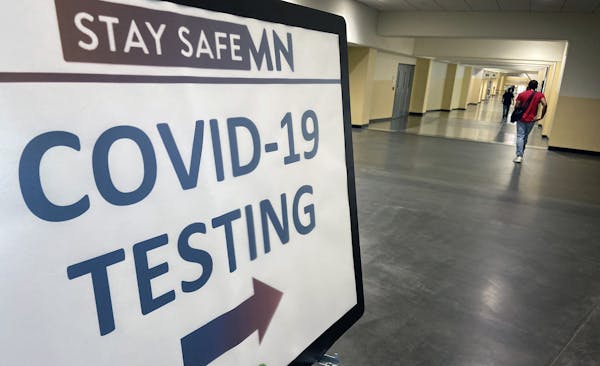COVID-19 vaccinations among nursing home workers have increased 8% since June even as the industry faces what it calls an unprecedented staff shortage.
Despite concerns that an upcoming federal vaccination mandate for long-term care workers would lead to resignations, Minnesota nursing homes so far have consistently managed to staff about two health care workers for every resident, although some are temporary employees.
The number of direct care workers has remained steady at about 44,000 from June through early September, according to data reported to the federal government by 339 of the state's 364 nursing homes.
Still, some facilities report that they lost workers after they required COVID-19 vaccinations.
Staff vaccination rates at nursing homes are now at 72%, up from 66% in the summer. Assisted-living facilities, which do not report employment data to the federal government, have a staff vaccination rate of 66%, according to the Minnesota Department of Health.
Industry leaders say their workforce problems go beyond any potential disruptions caused by a mandate.
"This is a deeper and broader workforce shortage than we have ever experienced," said Gayle Kvenvold, the chief executive at LeadingAge Minnesota, an industry trade group.
Staffing levels have dropped since the COVID-19 pandemic began while vacancies have increased.
"We are losing more people than we can recruit," Kvenvold said, with over 23,000 direct care jobs not filled, according to a survey of 300 senior care providers conducted by LeadingAge and Care Providers of Minnesota, the state's other trade group.
As a result, 69% of nursing homes and 29% of assisted-living facilities have limited new admissions.
This comes at a time when hospitals are treating record numbers of patients because of COVID-19 and other causes. Hospitals are having problems transferring patients to nursing homes, creating backlogs throughout the system.
"Seniors all across the state are either staying in a hospital longer than they need to or they are having to seek care in communities that are far from where they live," Kvenvold said.
Some long-term care facilities are filling the caregiver gap by hiring temporary employees from staffing agencies, but competition for those workers is increasing.
Minneota Manor, a nursing home in southwestern Minnesota, will close its doors by December because it can't find any permanent or temporary workers.
"Usually when we hit a point where we are feeling a little short and we need additional nursing support, we can bring in temporary nurses," said Jennifer Gleason, chief operations officer at the nonprofit Living Services Foundation, which operates Minneota Manor.
"We are working with multiple staffing agencies but they are just not available," she said.
One agency said it would provide a worker, but later reassigned its employee to another home. Minneota Manor also upped its wage scale and benefits in an attempt to recruit new workers.
"We believed we were very competitive with all health care providers in the market and I think our team truly believed that that would drive applications," Gleason said. "People didn't call to ask questions. There wasn't even anyone looking or interested."
The 23 residents at Minneota Manor will be offered rooms at its assisted-living facility, which is easier to staff because under state regulations there is not a requirement to have a nurse on site all day.
Some nursing homes report that staff have quit after the facilities made vaccines mandatory.
After Episcopal Homes of Minnesota in St. Paul mandated the COVID-19 shots in September, 75 of the 100 unvaccinated staff got the shot and 25 decided to leave.
"We lost 5% of our staff but we still feel strongly that it was the right move to make," Chief Executive Marvin Plakut said. Nearly 100% of its staff is at least partly vaccinated.
Plakut said the nursing home had done all it can to raise wages, but its finances are limited because state regulators set the reimbursement rates that it and all other nursing homes receive, including for patients who are not on Medical Assistance.
"We've done our part as much as we can but we don't have an unlimited budget," Plakut said. "The only thing that will help is if the state Legislature increases our rates."
The industry is also asking state government to provide help with staffing shortages. Some assistance is available to facilities that have COVID-19 outbreaks.
"What we are asking for is employee staffing support that isn't necessarily related to an outbreak of COVID," Kvenvold said.
That support would become more urgent once the federal mandate, which is yet to be finalized, takes effect.
"Without a doubt we have settings that are hearing from their workers that they will leave their jobs before they are vaccinated," she said.
Glenn Howatt • 612-673-7192
Twitter: @GlennHowatt

Want to share info with the Star Tribune? How to do it securely

'Safe recovery sites' would offer syringes, naloxone and more to people using drugs. The plan could be in peril.
New Minnesota GOP leaders seek peace with party's anti-establishment wing

Who is Republican Lisa Demuth, Minnesota's first House speaker of color?

